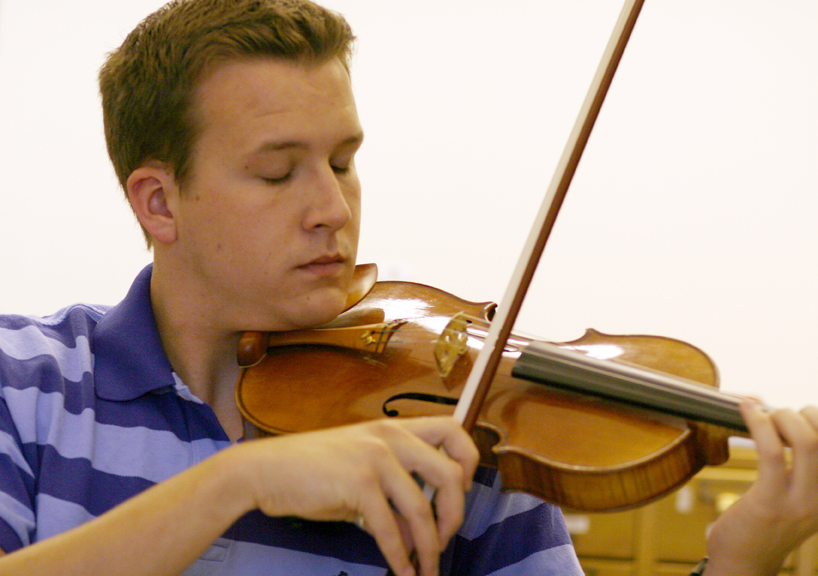Music that Enduresby Jim Amidon |
| Printer-friendly version | Email this article |
|
Andrew McKone ’07 was four years old when he saw Joshua Bell playing violin on the PBS children’s show Sesame Street. He turned to his mom, Silvia, and announced he wanted to learn to play the violin; he started Suzuki almost immediately.
The Wabash senior spent much of the next 18 years playing the violin, taking scores of private lessons, and performing in school, community, and state orchestras.
"What I love most is the instrument itself," McKone says with a bashful look that belies his stunning talent. "I love the different qualities of sound you can get from the violin. Like other stringed instruments, you can play it softly and sweetly, or you can play loud and boisterous."
The slightly built native of Glastonbury, Connecticut, is also an athlete—he spent three years as a member of Coach Peter Casares’ Wabash swimming team—so he’s naturally competitive.
"Playing the violin is such a challenge, too, and I like that," he says. "I expected to pick it up and be good right away. I soon realized—and continue to realize—how truly hard it is. That has always motivated me to push myself to do different things on it."
To continue to improve and push himself, McKone spent the spring semester of his junior year studying in Vienna, Austria.
"It is the musical epicenter of the universe," he says. "You have to love a country that spends more money on music than on national defense."
In his performance workshop class in Vienna, his talents and abilities were pushed to new levels. Each week the 30 instrumentalists were broken up into different ensembles. Each of those ensembles required at least two one-hour rehearsal sessions every week. Toss in time for private lessons and McKone had his violin resting under his chin for more than 20 hours per week.
"The greatest benefit was exposure to performance on a weekly basis with my peers," he explains. "Performing in ensembles is an awesome experience. When you make music with someone, you form a much deeper relationship with them.
"That class also gave me comfort with myself as a musician—the musician I am."
The greatest challenge in Vienna, though, had nothing to do with his own performance.
"I had a really difficult time critiquing the other musicians’ work," he says. "But we were expected to do it, and eventually it forced me to evaluate my own work more closely."
He wasn’t the only person evaluating his work. McKone’s personal teacher, Polish violinist Barbara Gorzynska, was strict and demanding. Once when he showed up for a rehearsal without having practiced his part, the teacher whacked him on the forehead with a pencil, saying, "If you ever come to my rehearsals without having practiced, I’ll rip your hair out!"
"She was just trying to get me to practice more," McKone recalls. "When I told her that I was especially interested in learning how violins are made, she introduced me to her friend, Martin Schwalb, a luthier with a small violin shop."
A couple of weeks later, McKone began to stop by the shop. He learned how Schwalb selects the perfect wood to ensure brilliant tonal quality; wood that comes from stock passed down through his family for more than 200 years. Even after several trips to the shop, McKone never saw Schwalb complete an actual violin—"it’s so slow, meticulous, and time-consuming."
He may not have seen a violin finished, but as he watched the master’s hands bring an instrument to life he saw something even more important—his future.
"That was such a profound moment for me," the Wabash music major recalls. "I decided then that’s what I wanted to do with my life."
"I’ve learned that, as a luthier, I can become intimately close with the instrument I love so much. And by crafting the instrument, I’ll have a much longer relationship with it.
"You can practice a long time for a performance," McKone says, "and no matter how good you are, when it’s over, it’s gone. Putting a violin together—creating it—is everything; it’s enduring."
It turns out that the country’s only accredited luthier program is at the Indiana University School of Music. The "classroom" for the tiny program is tucked in a corner of an upper floor in the main music building. It’s a three-year program, during which a student might produce a few instruments, tops. After completing the IU program, a five-year apprenticeship awaits McKone, who could only then be considered a master luthier and own his own shop.
Just as the process of crafting a violin is painstakingly slow, so too is the path to get there.
For now, McKone is happily enjoying his senior year, complete with a Spring Break trip to the Bahamas. He’s also preparing for his senior recital at Wabash, enjoying his many friends and Phi Kappa Psi fraternity brothers, and looking for summer work—as a musician.
While his life’s goal is to become a master luthier, McKone plans to stay in central Indiana and try out for the Indianapolis Symphony Orchestra or the city’s Chamber Orchestra. He’ll do that for a year or so while applying for graduate school at IU. The East-Coaster might eventually make his home in the Hoosier state.
"I like Indiana a lot," he says. "I love the flat landscape. I’m just a sucker for sunrises, sunsets, and wide-open skies."
Andrew McKone possesses a rare, keen, and mature appreciation of time and place. He speaks of time in far broader terms than most students his age—the grueling hours spent alone in practice rooms; the joyous but fleeting moments of a symphonic performance; and the
"Martin taught me how I could use my love of the violin for something other than performance," McKone says. "When I become a luthier, I’ll be able to make violins that could last forever."
Contact Andrew McKone at mckonea@wabash.edu
|

